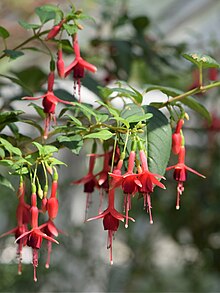
Fuchsia is a genus of flowering plants that consists mostly of shrubs or small trees.
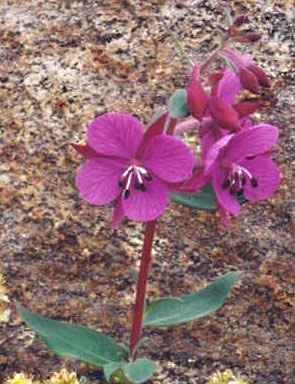
The Onagraceae are a family of flowering plants known as the willowherb family or evening primrose family. They include about 650 species of herbs, shrubs, and trees in 17 genera. The family is widespread, occurring on every continent from boreal to tropical regions.

Quercus coccinea, the scarlet oak, is a deciduous tree in the red oak section Lobatae of the genus Quercus, in the family Fagaceae.

Banksia coccinea, commonly known as the scarlet banksia, waratah banksia or Albany banksia, is an erect shrub or small tree in the family Proteaceae. Its distribution in the wild is along the south west coast of Western Australia, from Denmark to the Stokes National Park, and north to the Stirling Range, growing on white or grey sand in shrubland, heath or open woodland. Reaching up to 8 m (26 ft) in height, it is a single-stemmed plant that has oblong leaves, which are 3–9 cm (1.2–3.5 in) long and 2–7 cm (0.8–2.8 in) wide. The prominent red and white flower spikes appear mainly in the spring. As they age they develop small follicles that store seeds until opened by fire. Though widely occurring, it is highly sensitive to dieback and large populations of plants have succumbed to the disease.

Fuchsia excorticata, commonly known as tree fuchsia, New Zealand fuchsia and by its Māori name kōtukutuku, is a New Zealand native tree belonging to the family Onagraceae. It is commonly found throughout New Zealand and as far south as the Auckland Islands. It grows from sea level up to about 1,000 m (3,300 ft), particularly alongside creeks and rivers. It is easily recognised in its native environment by the characteristic appearance of its bark, which peels spontaneously, hanging in red papery strips to show a pale bark underneath. Its scientific name, excorticata, reflects this distinctive property.

Graptophyllum is a genus of plants in the family Acanthaceae. It includes 15 species with a disjunct distribution, with one species native to tropical Africa, and the others to New Guinea, Queensland, and the southwest Pacific Islands.

Justicia floribunda is a species of flowering plant in the acanthus family Acanthaceae, native to southern Brazil, Paraguay, and Misiones Province of northeastern Argentina.
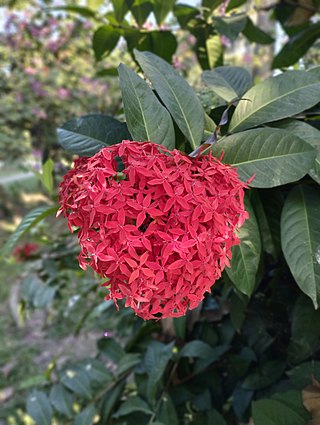
Ixora is a genus of flowering plants in the family Rubiaceae. It is the only genus in the tribe Ixoreae. It consists of tropical evergreen trees and shrubs and holds around 544 species. Though native to the tropical and subtropical areas throughout the world, its centre of diversity is in Tropical Asia. Ixora also grows commonly in subtropical climates in the United States, such as Florida where it is commonly known as West Indian jasmine.

Lathyrus lanszwertii is a species of sweet pea known by the common names Nevada sweet pea or peavine. It is found in western North America from California to Texas to British Columbia. It is a tender vining perennial which bears lavender, fuchsia, or white pea flowers, and pods containing inedible peas.

Boerhavia coccinea is a species of flowering plant in the four o'clock family which is known by many common names, including tar vinescarlet spiderling and red boerhavia.

Lumnitzera is an Indo-West Pacific mangrove genus in the family Combretaceae. An English common name is black mangrove. Lumnitzera, named after the German botanist, Stephan Lumnitzer (1750-1806), occurs in mangroves from East Africa to the Western Pacific, and northern Australia.
Timothy Charles Plowman was an American ethnobotanist best known for his intensive work over the course of 15 years on the genus Erythroxylum in general, and the cultivated coca species in particular. He collected more than 700 specimens from South America, housed in the collection of the Field Museum of Natural History. The standard author abbreviation Plowman is used to indicate this person as the author when citing a botanical name.
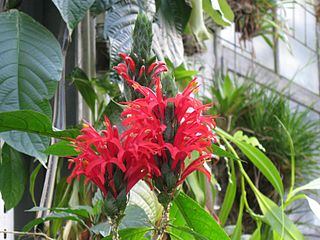
Pachystachys is a genus of 12 species of flowering plants in the family Acanthaceae, native to rainforest in the Caribbean and Central and South America. They are evergreen perennials and shrubs bearing prominent terminal spikes of flowers with brightly coloured bracts.

Aculops fuchsiae, commonly known as fuchsia gall mite, is a species of mite in the family Eriophyidae. It feeds on Fuchsia plants, causing distortion of growing shoots and flowers. It is regarded as a horticultural pest.
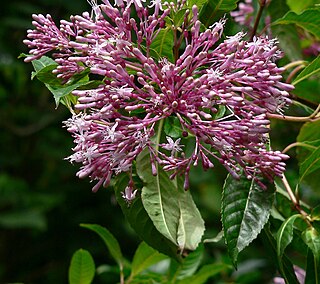
Fuchsia paniculata is a plant of the genus Fuchsia native to Central America. It belongs to the section Schufia and is most closely related to Fuchsia arborescens.

Fuchsia glazioviana, called Glaziou's fuchsia, is a species of flowering plant in the genus Fuchsia, native to southeast Brazil. It has gained the Royal Horticultural Society's Award of Garden Merit.

Fuchsia hatschbachii, called Hatschbach's fuchsia, is a species of flowering plant in the genus Fuchsia, endemic to the state of Paraná in Brazil. It has gained the Royal Horticultural Society's Award of Garden Merit. The species is named after Gert Hatschbach, Director of the Museu Botânico de Curitiba who collects and studies flora of Paraná.
Salpixantha coccinea is a species of flowering plant belonging to the family Acanthaceae. It is endemic to Jamaica. It is the sole species in genus Salpixantha.
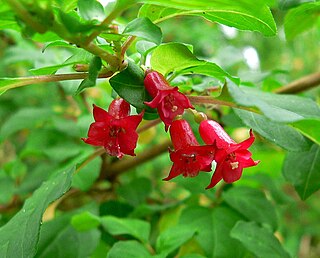
Fuchsia parviflora is a species of Fuchsia found in Mexico.

Fuchsia bracelinae is a species of Fuchsia found in Brazil.
